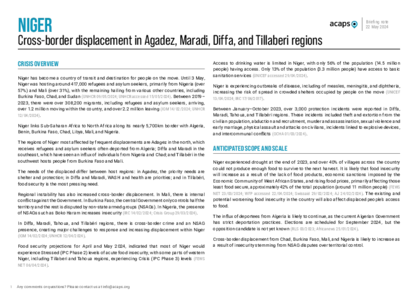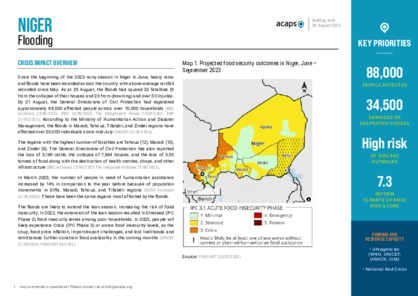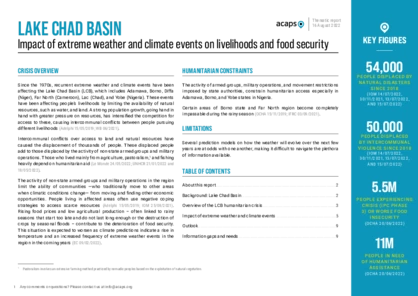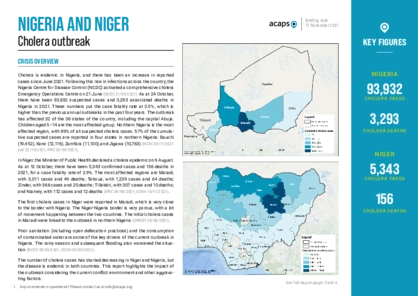Latest updates on country situation
03 February 2026
Acute food insecurity persists across Niger, with Crisis (IPC Phase 3) outcomes prevailing in Diffa, northern Tahoua, and Tillabéri regions, while Emergency (IPC Phase 4) conditions affect some displaced people as a result of flooding, according to FEWS NET. The latest Cadre Harmonisé analysis estimated 1.86 million people (7% of the assessed population) in acute food insecurity (CH Phase 3 or worse) from October–December 2025. This situation is likely to persist in early 2026 as insecurity disrupts agricultural livelihoods and market access, accelerating household food stock depletion and localised food price inflation. IPC acute malnutrition analysis projects 1.6 million children aged 6–59 months in acute malnutrition through July 2026. Critical humanitarian needs include food assistance, nutrition, health services, and livelihood support. Risks will intensify sharply during the June–August lean season, potentially increasing acute food insecurity prevalence. (IPC 08/01/2026, FEWS NET 29/01/2026, FAO 31/02/2026)
22 September 2025
Until 15 September 2025, severe flooding continued to devastate Niger, affecting nearly 268,000 people across 53 departments. At least 110 people have died, including 35 in the southern region of Maradi, the worst affected region. The floods have damaged more than 26,000 homes and 1,100 schools. Over 316 classrooms are serving as temporary shelters for displaced families, potentially disrupting education for more than 26,000 students, with the new school year set to begin in October. Agricultural losses have also been significant, with over 6,500 hectares of crops submerged, heightening concerns about food insecurity. Humanitarian assistance has reached nearly 19,000 households, and urgent needs remain, particularly for shelter and NFIs. Although the rainy season is gradually subsiding in most regions, moderate rainfall through the rest of September may prolong the impact of the floods, worsening food insecurity, malnutrition, and limited access to safe drinking water. (ECHO 17/09/2025, Copernicus 22/09/2025)
01 September 2025
Flooding in Niger has affected over 110,000 people since June 2025, with at least 47 deaths and damage to homes, crops, and infrastructure. Urgent needs include shelter, food, safe drinking water, and drainage support. Flood-prone areas such as Niamey and Agadez continue to face heavy impacts, with more rainfall expected through October. (RFI 22/08/2025, DW 27/08/2025, FEWS NET 29/08/2025)
24 June 2025
From 21–22 June 2025, an armed attack in Manda, Tillabéri, killed at least 71 civilians and wounded 20. A non-state armed group attacked worshippers near a mosque, burning homes. This follows an incident in March, when another mosque in Fambita was targeted, killing 44 civilians. Civilians continue to face significant protection risks in the border regions of Burkina Faso, Mali, and Niger. (RFI 23/06/2025, TV5MONDE 23/06/2025, Le Monde 24/06/2025)
09 June 2025
May 2025 was the deadliest month in recent years for civilians in Tillabéri region, with at least 113 civilian deaths – over three times the April total. In Kokorou commune alone, more than 70 people were killed. Heightened security threats, including a rise in improvised explosive device attacks and vehicle hijackings, have displaced at least 1,155 people across Bankilaré, Kokorou, and Téra communes. The displaced face food insecurity and malnutrition, with many eating less than two meals daily. (OCHA 04/06/2025, OCHA 05/06/2025)
29 April 2025
On 20 April 2025, Algerian authorities expelled more than 1,100 migrants – one of the largest single expulsions in recent years. The number of deportations reached nearly 4,000 that month in Assamaka. These expulsions are part of a longstanding trend, with over 30,000 expulsions recorded in 2024. The migrants are often left in the desert, without food or water, and must walk for hours to the IOM transit centre in Assamaka town. This journey is even more difficult because the temperature can reach over 40° C in the desert. Migrants often arrive in extremely vulnerable conditions, with urgent needs for food, shelter, medical care, and protection. In Assamaka, the limited infrastructure for basic social services struggles to meet the needs of both community members and stranded migrants. Migrants hosted in camps describe difficult living conditions, including overcrowding, inadequate resources, long registration delays, and lack of food. (IOM 21/04/2025, IOM 16/04/2025, RFI 24/04/2026)
28 August 2024
In the past three months, Niger has experienced its most severe flooding since 2020, affecting over 353,000 individuals and damaging 46,525 households by 20 August 2024. The floods have resulted in 217 fatalities and 200 injuries, with significant destruction to infrastructure and agriculture. Between 6 May and 16 August, the floods destroyed approximately 3,800 hectares of arable land, along with over 16,766 livestock. The southern regions, particularly Maradi, Tahoua, and Zinder, have been the hardest hit in terms of affected people and damaged houses. By 27 August, the capital city, Niamey, was still nearly isolated since 22 August as a result of rising floodwaters submerging major roads, with residents relying on canoes for transportation. During the continuing rainy season, the urgent needs of affected populations include essentials such as blankets, mats, soap, and mosquito nets. (CARE 23/08/2024, IFRC 20/08/2023, Qiraat African 27/08/2024)
current crises
in
Niger
These crises have been identified through the INFORM Severity Index, a tool for measuring and comparing the severity of humanitarian crises globally.
NER006 - Complex crisis in Niger
Last updated 31/01/2026
Drivers
Conflict/ Violence
Drought/drier conditions
Floods
Crisis level
Country
Severity level
3.6 High
Access constraints
3.0
Analysis products
on
Niger
22 May 2024
Niger: cross-border displacement in Agadez, Maradi, Diffa, and Tillaberi regions
DOCUMENT / PDF / 2 MB
Niger has become a country of transit and destination for people on the move. Until 3 May, Niger was hosting around 417,000 refugees and asylum seekers, primarily from Nigeria (over 57%) and Mali (over 31%), with the remaining hailing from various other countries, including Burkina Faso, Chad, and Sudan.
Attached resources
29 August 2023
Niger: flooding
DOCUMENT / PDF / 246 KB
The floods are likely to extend the lean season, increasing the risk of food insecurity. In 2023, people will likely experience Crisis (IPC Phase 3) or worse food insecurity levels, as the coup, food price inflation, import/export challenges, and lost livelihoods and remittances further constrain food availability in the coming months
17 August 2022
Lake Chad Basin: Impact of extreme weather & climate events on food security
DOCUMENT / PDF / 1 MB
This report aims to explore the impact of extreme weather and climate events on the humanitarian situation in the Lake Chad Basin. Since the 1970s in West and Central Africa, river floods and agricultural and ecological droughts have been increasing while average rainfall has been decreasing. These phenomena have an impact on availability of resources and land, and consequently on the economic and living conditions of the regions’ populations.






